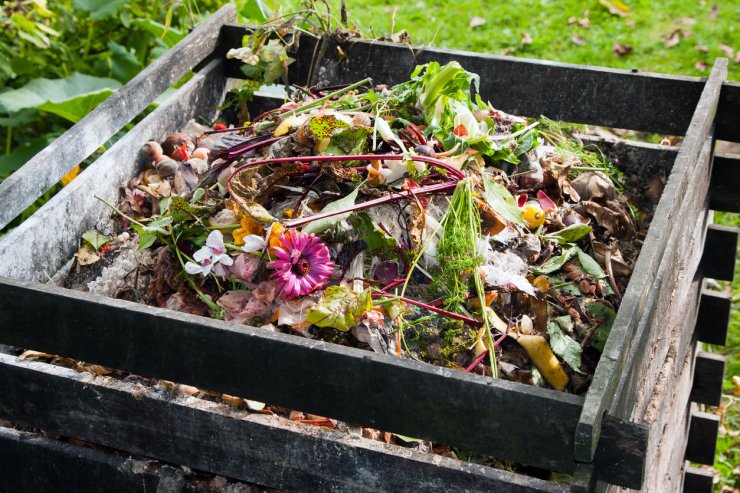
I’m guessing before we get into this, you want to know what the heck compost tea is. It certainly ain’t your afternoon cup of Earl Grey, I can tell you that. I don’t care how much honey you stir in, you don’t want to drink this stuff.
For your garden, however, it’s a different story. We already know how much compost can contribute to the health of your soil. The idea behind compost tea is that the more concentrated formula (aka compost tea) will be easier and faster for your plants to absorb. Think Advil Liqui-gels vs. coated caplets when you’re trying to get rid of that headache quickly. (And no, I don’t mean those door-to-door solicitors. You’re on your own for that.)
Incidentally, there’s a bit of controversy around how well this actually works. I’ll touch on that below, but let’s start with the issue at hand.
Discover 7 top tips for growing, harvesting, and enjoying tomatoes from your home garden—when you access the FREE guide The Best Way to Grow Tomatoes, right now!
How to make and use compost tea
Compost tea is what you get when you soak your finished compost in water. The tea that you end up with is said to increase plant growth, help suppress disease, and add beneficial organisms to your garden.
There are plenty of recipes out there in the cyber universe, but they all have one very important thing in common: they start with finished compost. Beyond that, well, take your pick. You can go with aerated or non-aerated compost tea. Some recipes are just compost and water. Others include anything from molasses or syrup (the sugar helps kickstart the bacteria), an air pump, fish hydrolysate, seaweed extract, or straw.
One basic recipe is this:
Place your aerator (the kind you find in a fish tank works just fine) in a 5-gallon bucket. Fill about one-eighth of the bucket with finished compost, then fill with clean, non-chlorinated water. Add about 2 tablespoons of molasses. Wait 24- to 48- hours and strain the tea through an old shirt, burlap sack, or mesh strainer. Dilute your tea (about a 1:4 ratio) and use it within a few hours.
How do you use it? Ideally, you can “water” your vegetables with the tea near the roots. Some people also spray plant leaves with it, with the assumption that the good bacteria in the tea will inhibit the growth of bad bacteria.
The controversy around compost tea
Despite the many proponents of this “liquid gold,” as it’s been called, there are some who are firm believers in compost, but not so much in compost tea. Linda Chalker-Scott, Ph.D, Extension Horticulturist and Associate Professor at Washington State University does not recommend compost tea due to the lack of scientific evidence of its efficacy. In fact, there is some evidence that these teas may contain E. coli and Salmonella.
Similarly, horticulturist Christopher Enroth, who teaches at the University of Illinois Extension College of Agricultural, Consumer, & Environmental Sciences, points out that “scientific studies are showing that compost tea often has no effect on disease control.” Even worse, it seems more likely that “the opposite effect occurs with more disease!”
What does all this mean for your garden vegetables? We already know compost works. And clearly, making compost tea requires a bit of effort. I’m not here to tell anyone what to do, but personally, I’m happy to stick with plain old compost. Even though it seems like the tea would make a good addition to the soil itself, why make things more complicated than they need to be?
What do you think? Have you used compost tea? Did you notice any differences in the way your vegetables grew?
Discover 7 top tips for growing, harvesting, and enjoying tomatoes from your home garden—when you access the FREE guide The Best Way to Grow Tomatoes, right now!





I am a believer in worm compost tea. I have kept a worm bin for many years and my plants love it. Also I add a handful of worm compost to every plant when I plant it. Gives them a boost. Michael
Yes I have made and used COMPOST TEA. Plants think it’s DELICIOUS and this shows in their growth. I also make an indoor ‘TEA’ throught the indoor season and use it to water my indoor plants. Banana peels and used tea bags are easy to pop into a container and JUST ADD WATER. It’s useab;le in a day or so and nothing is wasted. Then the left overs are added to my outdoor compost bin, and they keep on giving. EASY TO DO an good results.
Compost and pee work amazingly. Have tested both on plants.
I use pee 1:12 pee/water ratio. I do the fermented banana peel tea thing and have done the compost tea too. Pee for Peetunias and other flowers.
Of course, all my pots have a special compot blend. Grass clippings and dead leaves make for a perfect spongy medium when mixed with a few other ingredients!